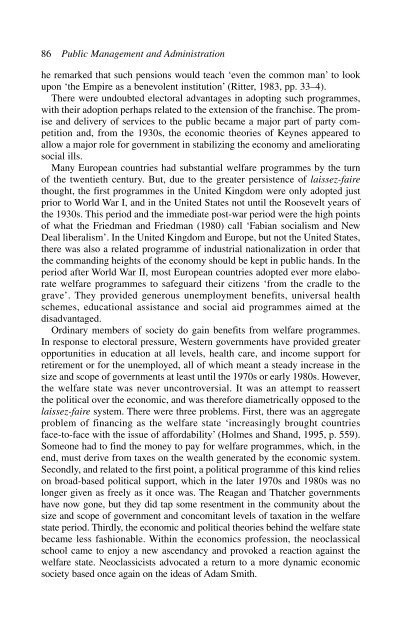Public Management and Administration - Owen E.hughes
Public Management and Administration - Owen E.hughes
Public Management and Administration - Owen E.hughes
Create successful ePaper yourself
Turn your PDF publications into a flip-book with our unique Google optimized e-Paper software.
86 <strong>Public</strong> <strong>Management</strong> <strong>and</strong> <strong>Administration</strong><br />
he remarked that such pensions would teach ‘even the common man’ to look<br />
upon ‘the Empire as a benevolent institution’ (Ritter, 1983, pp. 33–4).<br />
There were undoubted electoral advantages in adopting such programmes,<br />
with their adoption perhaps related to the extension of the franchise. The promise<br />
<strong>and</strong> delivery of services to the public became a major part of party competition<br />
<strong>and</strong>, from the 1930s, the economic theories of Keynes appeared to<br />
allow a major role for government in stabilizing the economy <strong>and</strong> ameliorating<br />
social ills.<br />
Many European countries had substantial welfare programmes by the turn<br />
of the twentieth century. But, due to the greater persistence of laissez-faire<br />
thought, the first programmes in the United Kingdom were only adopted just<br />
prior to World War I, <strong>and</strong> in the United States not until the Roosevelt years of<br />
the 1930s. This period <strong>and</strong> the immediate post-war period were the high points<br />
of what the Friedman <strong>and</strong> Friedman (1980) call ‘Fabian socialism <strong>and</strong> New<br />
Deal liberalism’. In the United Kingdom <strong>and</strong> Europe, but not the United States,<br />
there was also a related programme of industrial nationalization in order that<br />
the comm<strong>and</strong>ing heights of the economy should be kept in public h<strong>and</strong>s. In the<br />
period after World War II, most European countries adopted ever more elaborate<br />
welfare programmes to safeguard their citizens ‘from the cradle to the<br />
grave’. They provided generous unemployment benefits, universal health<br />
schemes, educational assistance <strong>and</strong> social aid programmes aimed at the<br />
disadvantaged.<br />
Ordinary members of society do gain benefits from welfare programmes.<br />
In response to electoral pressure, Western governments have provided greater<br />
opportunities in education at all levels, health care, <strong>and</strong> income support for<br />
retirement or for the unemployed, all of which meant a steady increase in the<br />
size <strong>and</strong> scope of governments at least until the 1970s or early 1980s. However,<br />
the welfare state was never uncontroversial. It was an attempt to reassert<br />
the political over the economic, <strong>and</strong> was therefore diametrically opposed to the<br />
laissez-faire system. There were three problems. First, there was an aggregate<br />
problem of financing as the welfare state ‘increasingly brought countries<br />
face-to-face with the issue of affordability’ (Holmes <strong>and</strong> Sh<strong>and</strong>, 1995, p. 559).<br />
Someone had to find the money to pay for welfare programmes, which, in the<br />
end, must derive from taxes on the wealth generated by the economic system.<br />
Secondly, <strong>and</strong> related to the first point, a political programme of this kind relies<br />
on broad-based political support, which in the later 1970s <strong>and</strong> 1980s was no<br />
longer given as freely as it once was. The Reagan <strong>and</strong> Thatcher governments<br />
have now gone, but they did tap some resentment in the community about the<br />
size <strong>and</strong> scope of government <strong>and</strong> concomitant levels of taxation in the welfare<br />
state period. Thirdly, the economic <strong>and</strong> political theories behind the welfare state<br />
became less fashionable. Within the economics profession, the neoclassical<br />
school came to enjoy a new ascendancy <strong>and</strong> provoked a reaction against the<br />
welfare state. Neoclassicists advocated a return to a more dynamic economic<br />
society based once again on the ideas of Adam Smith.











